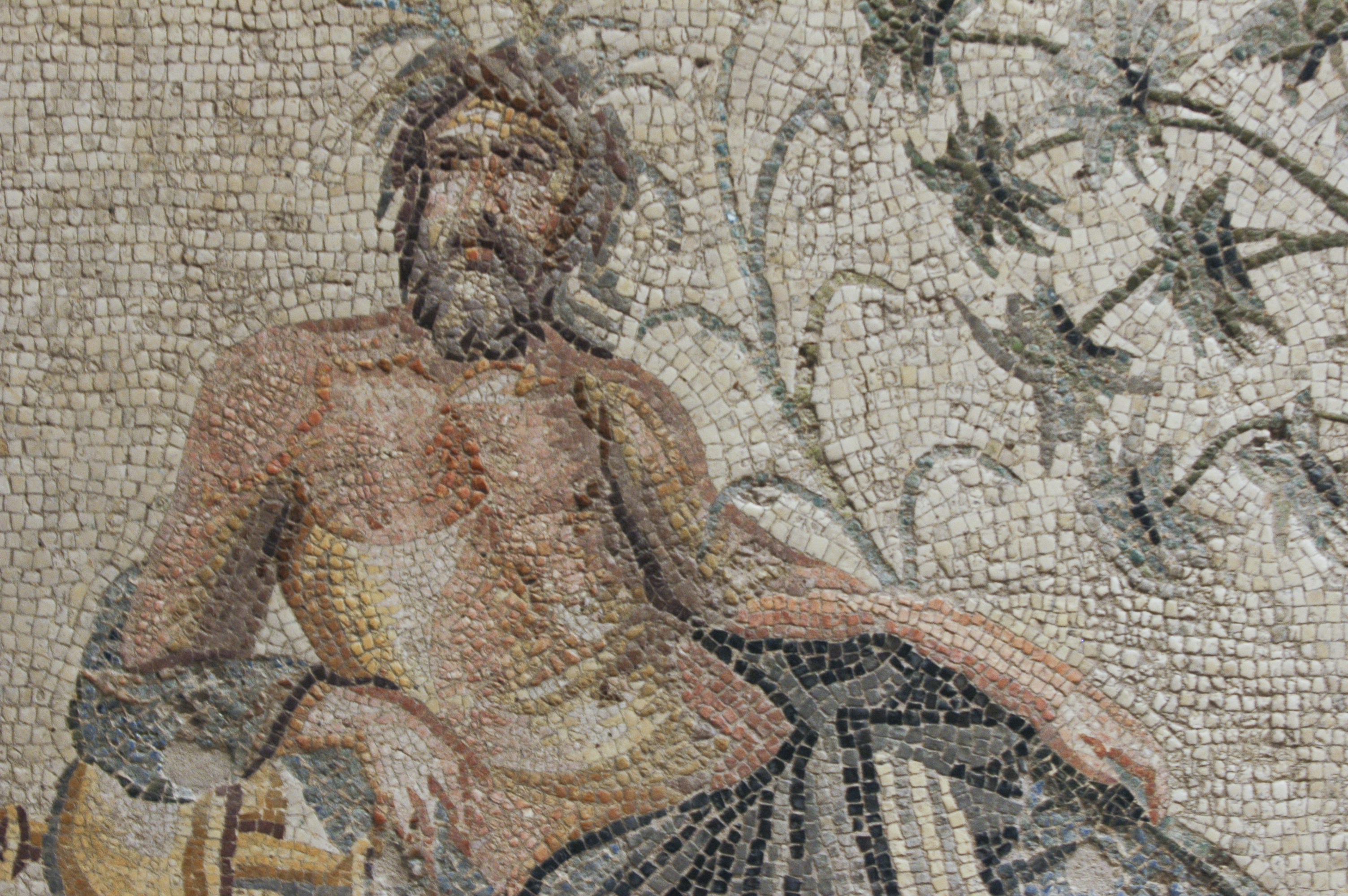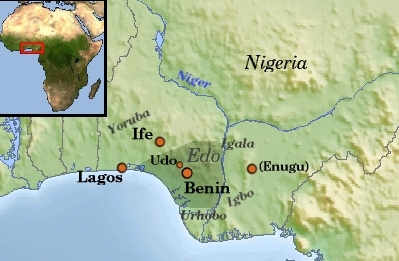|
Olokun
Olokun (Yoruba: Olókun) is an orisha spirit in Yoruba religion. Olokun is believed to be the parent of Aje, the orisha of great wealth and of the bottom of the ocean. Olokun is revered as the ruler of all bodies of water and for the authority over other water deities. Olokun is highly praised for their ability to give great wealth, health, and prosperity to their followers. Communities in both West Africa and the African diaspora view Olokun variously as female, male, or androgynous. West Africa Water deities are "ubiquitous and vitally important in southern Nigeria"; Olókun worship is especially noted in the cities of the Edo people in southwest Nigeria. In West African areas directly adjacent to the coast, Olokun takes a male form among his worshipers while in the hinterland, Olokun is a female deity. According to Yoruba traditions about their divine dynasty, Olokun - in her female incarnation - was the senior wife of Emperor Oduduwa. Her rivalry with one of his other wive ... [...More Info...] [...Related Items...] OR: [Wikipedia] [Google] [Baidu] |
Yoruba People
The Yoruba people (, , ) are a West African ethnic group that mainly inhabit parts of Nigeria, Benin, and Togo. The areas of these countries primarily inhabited by Yoruba are often collectively referred to as Yorubaland. The Yoruba constitute more than 42 million people in Africa, are a few hundred thousand outside the continent, and bear further representation among members of the African diaspora. The vast majority of the Yoruba population is today within the country of Nigeria, where they make up 21% of the country's population according to CIA estimations, making them one of the largest List of ethnic groups of Africa, ethnic groups in Africa. Most Yoruba people speak the Yoruba language, which is the Niger–Congo languages, Niger-Congo language with the largest number of native or L1 speakers. In Africa, the Yoruba are contiguous with the Yoruboid languages, Yoruboid Itsekiri to the south-east in the northwest Niger Delta, Bariba people, Bariba to the northwest in Benin a ... [...More Info...] [...Related Items...] OR: [Wikipedia] [Google] [Baidu] |
Orisha
Orishas (singular: orisha) are spirits that play a key role in the Yoruba religion of West Africa and several religions of the African diaspora that derive from it, such as Cuban, Dominican and Puerto Rican Santería and Brazilian Candomblé. The preferred spelling varies depending on the language in question: òrìṣà is the spelling in the Yoruba language, orixá in Portuguese, and orisha, oricha, orichá or orixá in Spanish-speaking countries. According to the teachings of these religions, the orishas are spirits sent by the supreme creator, Olodumare, to assist humanity and to teach them to be successful on ''Ayé'' (Earth). Rooted in the native religion of the Yoruba people, most orishas are said to have previously existed in òrún - the spirit world - and then became Irúnmọlẹ̀ - spirits or divine beings incarnated as human on Earth. Irunmole took upon a human identity and lived as ordinary humans in the physical world, but because they had their origin in the ... [...More Info...] [...Related Items...] OR: [Wikipedia] [Google] [Baidu] |
Water Deities
A water deity is a deity in mythology associated with water or various bodies of water. Water deities are common in mythology and were usually more important among civilizations in which the sea or ocean, or a great river was more important. Another important focus of worship of water deities has been springs or holy wells. As a form of animal worship, whales and snakes (hence dragons) have been regarded as godly deities throughout the world (as are other animals such as turtles, fish, crabs, and sharks). In Asian lore, whales and dragons sometimes have connections. Serpents are also common as a symbol or as serpentine deities, sharing many similarities with dragons. Africa and the Mediterranean Sub-Sahara Africa Western Niger-Congo Benin * Ezili, goddess of sweet water, beauty, and love. Dogon *Nommos, amphibious spirits that are worshiped as ancestors. Serer * Mindiss (or Mindis) is not a deity in Serer religion, but a pangool with goddess–like attributes. She is ... [...More Info...] [...Related Items...] OR: [Wikipedia] [Google] [Baidu] |
Orisha
Orishas (singular: orisha) are spirits that play a key role in the Yoruba religion of West Africa and several religions of the African diaspora that derive from it, such as Cuban, Dominican and Puerto Rican Santería and Brazilian Candomblé. The preferred spelling varies depending on the language in question: òrìṣà is the spelling in the Yoruba language, orixá in Portuguese, and orisha, oricha, orichá or orixá in Spanish-speaking countries. According to the teachings of these religions, the orishas are spirits sent by the supreme creator, Olodumare, to assist humanity and to teach them to be successful on ''Ayé'' (Earth). Rooted in the native religion of the Yoruba people, most orishas are said to have previously existed in òrún - the spirit world - and then became Irúnmọlẹ̀ - spirits or divine beings incarnated as human on Earth. Irunmole took upon a human identity and lived as ordinary humans in the physical world, but because they had their origin in the ... [...More Info...] [...Related Items...] OR: [Wikipedia] [Google] [Baidu] |
Yoruba Religion
The Yoruba religion (Yoruba: Ìṣẹ̀ṣe), or Isese, comprises the traditional religious and spiritual concepts and practice of the Yoruba people. Its homeland is in present-day Southwestern Nigeria, which comprises the majority of Oyo, Ogun, Osun, Ondo, Ekiti, Kwara and Lagos States, as well as parts of Kogi state and the adjoining parts of Benin and Togo, commonly known as Yoruba land. It shares some parallels with the Vodun practiced by the neighboring Fon and Ewe peoples to the west and to the religion of the Edo people and Igala people to the east. Yoruba religion is the basis for a number of religions in the New World, notably Santería, Umbanda, Trinidad Orisha, and Candomblé. Yoruba religious beliefs are part of Itàn (history), the total complex of songs, histories, stories, and other cultural concepts which make up the Yoruba society. Term The Yoruba name for the Yoruba indigenous religion is Ìṣẹ̀ṣẹ, which also refers to the traditions and ritual ... [...More Info...] [...Related Items...] OR: [Wikipedia] [Google] [Baidu] |
Yoruba Deities
The Yoruba are most likely the most well-known West African ethnic group in the world due to their vast population in West Africa and broad dispersion through enslavement in the Americas. The Republic of Benin and Nigeria contain the highest concentrations of Yoruba people and Yoruba faiths in all of Africa. Brazil, Cuba, Haiti, Jamaica, Trinidad, and Tobago are the Americas countries where Yoruba cultural influences are the most noticeable, particularly in popular religions like Vodon, Santéria, Camdomblé, and Macumba. (In 1989, it was believed that more than 70 million individuals in Africa and the New World participated in Yoruba religion in one way or another.) The most prevalent West African religions, both in Africa and the Americas, are likely those of the Yoruba people or those that were influenced by them. These West African faiths may also have the most intricate theologies. For instance, the Yoruba are thought to have a pantheon of up to 6,000 deities. The following i ... [...More Info...] [...Related Items...] OR: [Wikipedia] [Google] [Baidu] |
Bini People
The Edo or Benin people are an Edoid ethnic group primarily found in Edo State, Southern part of Nigeria. They speak the Edo language and are the descendants of the founders of the Benin Empire. They are closely related to other ethnic groups that speak Edoid languages, such as the Esan, the Afemai, the Isoko, and the Urhobo. The name "Benin" (and "Bini") is a Portuguese corruption, ultimately from the word "Ubini", which came into use during the reign of Oba (ruler) Ewuare the Great, c. 1440. "Ubini", a word meaning Vexation, used by Prince Oranmiyan, son of the wealthy ruler of Uhe (Ife) to describe the frustration he encountered after he was invited to rule benin. ''Ubini'' was later corrupted to ''Bini'' by the mixed ethnicities living together at the centre; and further corrupted to ''Benin'' around 1485 when the Portuguese began trade relations with Oba Ewuare giving them coral beads. History Administrative region Edo people can be found in Nigeria's Edo Sta ... [...More Info...] [...Related Items...] OR: [Wikipedia] [Google] [Baidu] |
Edo People
The Edo or Benin people are an Edoid ethnic group primarily found in Edo State, Southern part of Nigeria. They speak the Edo language and are the descendants of the founders of the Benin Empire. They are closely related to other ethnic groups that speak Edoid languages, such as the Esan, the Afemai, the Isoko, and the Urhobo. The name "Benin" (and "Bini") is a Portuguese corruption, ultimately from the word "Ubini", which came into use during the reign of Oba (ruler) Ewuare the Great, c. 1440. "Ubini", a word meaning Vexation, used by Prince Oranmiyan, son of the wealthy ruler of Uhe (Ife) to describe the frustration he encountered after he was invited to rule benin. ''Ubini'' was later corrupted to ''Bini'' by the mixed ethnicities living together at the centre; and further corrupted to ''Benin'' around 1485 when the Portuguese began trade relations with Oba Ewuare giving them coral beads. History Administrative region Edo people can be found in Nigeria's Edo Sta ... [...More Info...] [...Related Items...] OR: [Wikipedia] [Google] [Baidu] |
Atlantic Ocean
The Atlantic Ocean is the second-largest of the world's five oceans, with an area of about . It covers approximately 20% of Earth's surface and about 29% of its water surface area. It is known to separate the " Old World" of Africa, Europe and Asia from the "New World" of the Americas in the European perception of the World. The Atlantic Ocean occupies an elongated, S-shaped basin extending longitudinally between Europe and Africa to the east, and North and South America to the west. As one component of the interconnected World Ocean, it is connected in the north to the Arctic Ocean, to the Pacific Ocean in the southwest, the Indian Ocean in the southeast, and the Southern Ocean in the south (other definitions describe the Atlantic as extending southward to Antarctica). The Atlantic Ocean is divided in two parts, by the Equatorial Counter Current, with the North(ern) Atlantic Ocean and the South(ern) Atlantic Ocean split at about 8°N. Scientific explorations of the A ... [...More Info...] [...Related Items...] OR: [Wikipedia] [Google] [Baidu] |
Ogun
Ogun or Ogoun (Yoruba: Ògún, Portuguese: Ogum, Gu; also spelled Oggun or Ogou; known as Ogún or Ogum in Latin America) is a spirit that appears in several African religions. He attempted to seize the throne after the demise of Obatala, who reigned twice, before and after Oduduwa, but was ousted by Obamakin (Obalufon Ogbogbodirin) and sent on an exile - an event that serves as the core of the Olojo Festival. Ogun was a warrior and a powerful spirit of metal work, as well as of rum and rum-making. He is also known as the "god of iron" and is present in Yoruba religion, Haitian Vodou, and West African Vodun. Yoruba religion In Yoruba religion, Ogun is a primordial orisha in Yoruba Land. In some traditions, he is said to have cleared a path for the other orisha to enter Earth, using a metal axe and with the assistance of a dog. To commemorate this, one of his praise names, or ''oriki'', is ''Osin Imole'' or the "first of the primordial Orisha to come to Earth". He is the god of ... [...More Info...] [...Related Items...] OR: [Wikipedia] [Google] [Baidu] |







